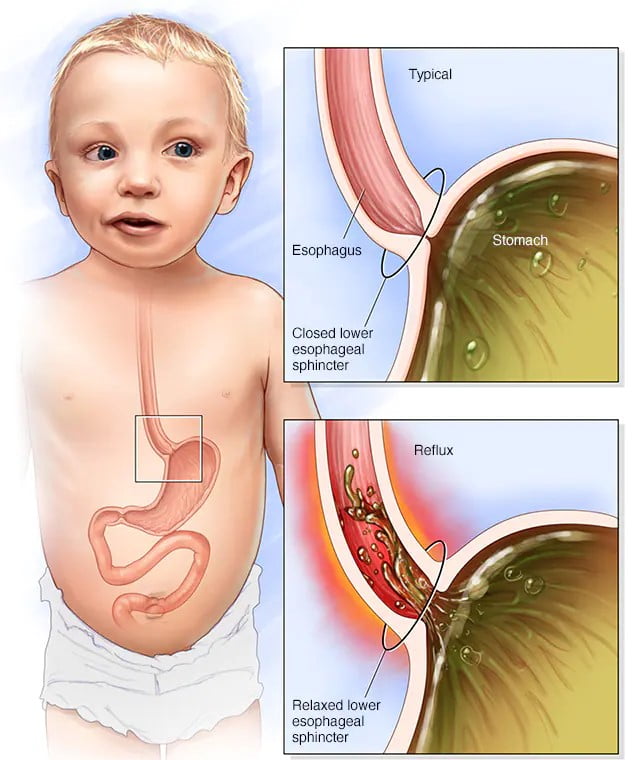Diagnosing Infant Reflux
Initial Assessment A health care provider will conduct a physical examination and inquire about your baby’s symptoms. If your baby appears healthy, is growing normally, and seems content, further tests are typically unnecessary. However, in certain situations, the following may be recommended:
- Ultrasound: This test can identify conditions like pyloric stenosis.
- Laboratory Tests: Blood and urine analyses can help pinpoint or exclude potential causes of persistent vomiting and inadequate weight gain.
- Esophageal pH Monitoring: A doctor will insert a slender tube into the baby’s esophagus via the nose or mouth to measure esophageal acidity. This procedure may require a hospital stay for monitoring.
- X-rays: These can reveal digestive tract issues, such as obstructions. A contrast liquid, often barium, may be administered to the baby before the test.
- Upper Endoscopy: A doctor will use an endoscope—a tube with a camera and light—to examine the esophagus, stomach, and upper small intestine. Biopsies may be taken. This procedure is generally performed under general anesthesia in infants and children.
Treatment Approaches Most infants find relief from reflux through dietary adjustments until it naturally subsides.
Medications Reflux medications are not standard for simple cases in children. However, acid-blocking drugs like cimetidine (Tagamet HB), famotidine (Pepcid AC), and omeprazole magnesium (Prilosec) may be prescribed for several weeks or months if your baby:
- Experiences inadequate weight gain despite dietary changes.
- Shows reluctance to feed.
- Suffers from esophageal inflammation.
- Has persistent asthma.
Surgical Intervention Surgery is rare and considered only if the baby fails to gain sufficient weight or has breathing difficulties due to reflux. The procedure involves tightening the LES to prevent acid backflow.
Home Remedies and Lifestyle Adjustments To reduce reflux:
- Feed your baby upright and maintain the position for 30 minutes post-feeding to utilize gravity’s aid.
- Opt for smaller, more frequent feedings, reducing the quantity if bottle-feeding or shortening nursing sessions.
- Burp your baby regularly during and after feedings to release trapped air.
- Place your baby on their back for sleep, even with reflux present.
Remember, infant reflux is typically not alarming. Keep burp cloths ready while you wait for your baby’s reflux to resolve.
Appointment Preparation You might consult your primary care provider or be directed to a pediatric gastroenterologist.
Pre-Visit Considerations Before the appointment, check if any preparatory steps are needed. Compile a list of:
- Your baby’s symptoms, even those seemingly unrelated to the appointment’s purpose.
- Essential personal details, including significant stressors, recent life changes, and family health history.
- All substances your baby is taking, including medications, vitamins, or supplements, along with their dosages.
- Questions to ask the doctor.
- Details about caregivers and their feeding methods.
If possible, bring someone along to the appointment to help remember the provided information.
Questions to Discuss with Your Doctor Regarding Infant Reflux
Inquiries for Your Doctor:
- What could be the primary reason for my baby’s reflux symptoms?
- Apart from the most apparent cause, what other factors could be contributing to my baby’s reflux?
- Are there specific tests required to diagnose my baby’s condition?
- Do you consider my baby’s reflux a short-term issue or a more persistent one?
- Could you suggest the most effective treatment strategy?
- What are other treatment options if the initial recommendation doesn’t suit my baby?
- Given my baby’s additional health issues, how can we coordinate care effectively?
- Are there any particular guidelines or restrictions we should follow for my baby?
- Is it necessary to consult a specialist for my baby’s condition?
- Can you provide any educational materials or recommend trustworthy online resources for more information?
Expectations During the Doctor’s Evaluation: Your doctor will likely inquire about:
- The onset of your baby’s reflux symptoms.
- The frequency and consistency of the symptoms.
- The intensity of the symptoms and their impact on your baby.
- Any actions or treatments that seem to alleviate the symptoms.
- Factors that appear to exacerbate the symptoms or the condition.
Feel free to ask any additional questions that come to mind during your consultation. It’s important to have a clear understanding of your baby’s health and the available care options.


